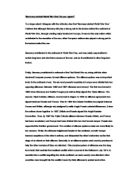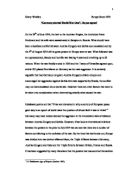Secondly, the German armies were winning too much land. It may sound like a good thing for them, however, this new land needed to be protected. When the German offensive “operation Michael” took place, the Germans won 1200 square miles of land, and 50 more miles of frontline. But, it ended up taking more men to protect the land than it had taken to win it in the first place, therefore benefiting the allies. Also, the battle of Passchendaele in 1917 played a role in British success. Although little land was won for the allies, the battle weakened German morale and this effected there fighting, enabling Britain to win more battles in the long run.
Also, there was the war at sea. Whilst men were fighting in Europe, there were many more soldiers in warfare off the shores of both Germany and Britain. WWI was the first time that German U-Boats (unterboots) were used. This technology enabled Germany to win more battles at sea. However, this new way of fighting may have been too successful. The U-Boats were sinking millions of tons of shipping entering Britain, which included food and essential items for the troops and the civilians. This was the beginning of the German blockade. Britain handled the blockade well and introduced systems such as rationing and women’s land army, which all helped in the distribution of the food, in order to meet the demand. But the Germans were not as prepared. When the British blockaded their ports, stopping food and essential goods from entering Germany, the people began to suffer. Malnutrition became a big worry and lead to disease and death or both troops and civilians.
But the U-Boats didn’t just target supply ships. They began attacking passenger liners in unrestricted submarine warfare. On the 7th May 1915, the German’s torpedoed a liner named the ‘Lusitania’. With British passengers onboard, the sinking was thought of as barbaric and wrong. However, it was the few American passengers onboard that are said to have changed the whole face of the war. Outraged at the German attack, the Americans joined the side of the British and became a powerful ally in 1917. Also, as America joined the war, two of Germanys biggest allies left. Bulgaria, Austria and Hungary were all either defeated or surrendered.
Also, there was a change in power during the war that proved a great advantage for Britain and the allies. Ferdinand Foch was put in sole charge of the allied armies, and he succeeded in his job. The Germans did not have a leader of such a standard and their army became disorganised.
Finally, there was the improvement in weaponry and technology. Allied tactics improved greatly with the introduction of tanks and salients (bulges in the frontline into the enemy territory) were avoided. Also, Britain was beginning to match Germany’s submarine power, and with this, the German Navy refused to attack the British fleet.
Therefore, there are many reasons there that show how Germany lost the war. Whether it was the increase of British success, or the declining morale and power of the Germans nobody knows. However, we see that both contributed to the overall victory of Britain and the allies. Whilst Britain handled the problems that arose with the blockade and defeats in battle, the Germans could not. In creating organisations such as DORA and the Woman’s Army Auxiliary Core, the British showed that they could not only handle the frontline, but that everything back home was being handled just as well. Therefore, I think Germany lost the war because although they were strong at sea and on the frontline, the land they gained or the success of the U-Boats was not always a good thing, and made a real difference to the way the war turned out.







